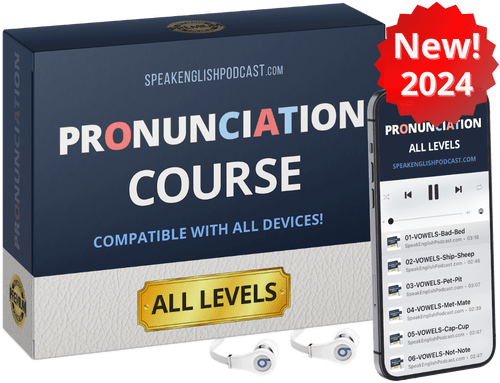#298 Differences between Do and Make
Transcript:
Hi! I’m Georgiana, and I’m back with a new episode. I’m here to help you speak English fluently. And what do you need to speak fluently? You need to LISTEN, LISTEN, LISTEN, and LISTEN. 🙂
If you want to help me, SHARE the podcast with your friends and family. That would mean a lot. Thanks.
On my website you can get the 5 Secrets to speak English and also my premium courses.
Before we start, get the transcript at: SpeakEnglishPodcast.com/podcast
It’s completely free!
Ok, let’s start!
Today, we’re going to talk about something that confuses many students: when to use “do” and when to use “make.”
When to Use “Do”
Let’s start with “do.” We use “do” when we talk about general tasks or activities that don’t create something new. It’s like saying you’re doing something that’s part of your routine. Let’s hear some examples:
- Do homework: “After school, I always do my homework.”
- Do the dishes: “In our house, we do the dishes right after dinner.”
- Do exercises: “My friend does exercises every morning to stay healthy.”
So remember, when you’re talking about doing a job or something you need to finish, “do” is the word to use!
When to Use “Make”
Now, let’s talk about “make.” We use “make” when we create something or when there’s a result from what we do. It’s like making something new or making a choice.
Here are some examples with “Make:”
- Make a cake: “Why don’t you make a delicious cake?”
- Make a decision: “It can be tough, but everyone needs to make decisions sometimes.”
- Make a phone call: “I make a phone call to check on my friend every week.”
Remember that when something new is created from what you do, like a cake or a decision, you should use “make.”
Let’s hear more examples:
- Do your best: “In every competition, it’s important to do your best.”
- Do your hair: “Every morning, I do my hair before going to school.”
- Do the laundry: “We usually do the laundry on Saturdays.”
- Do a favor: “Could you do me a favor and pass the salt?”
- Do business: “His company does business with clients worldwide.”
- Do a dance: “At the party, everyone was doing a fun dance.”
- Do damage: “The storm did a lot of damage to the town.”
More Examples Using “Make:”
- Make friends: “When you go to a new school, it’s important to make friends.”
- Make a list: “Before we go shopping, let’s make a list of everything we need.”
- Make a joke: “He likes to make jokes to make everyone laugh.”
- Make peace: “After arguing, they made peace and were friends again.”
- Make money: “She has a wonderful job that helps her make a lot of money.”
- Make a plan: “Let’s make a plan for the trip.”
- Make a choice: “You need to make a choice; even if you don’t like it.”
Great! Let’s continue practicing “do” and “make” with a on point-of-view lesson.
POV-Story (Learn grammar in context)
I will tell you the same story twice. So, make sure to focus on the changes.
You can find these techniques fully implemented in my premium courses.
SpeakEnglishPodcast.com/courses
Okay! Let’s start!
Emma was a lovely girl who loved helping her family. One day, she had a list of tasks to complete, including “do” and “make” activities. She was eager to start her day.
The morning began with Emma making her bed. She carefully pulled the sheets tight and fluffed her pillows, making her room look neat. After finishing her bed, she went to the kitchen to do the dishes from the previous night. She enjoyed washing dishes because it made the kitchen look clean again.
Then, her mother asked her if she could make pancakes. Emma mixed the flour, eggs, and milk while her mother heated the pan. Together, they made a big stack of fluffy pancakes. They sat down to enjoy the delicious breakfast they had made.
Later, she noticed her little brother struggling with his art project. He needed to make a poster about the seasons. Emma helped him choose the right colored papers and markers.
Her brother was very happy and told her he couldn’t have made it look so good without her help.
In the evening, Emma’s mom asked her to do a quick grocery run. Emma made a shopping list and walked to the store.
When she returned, Emma helped her mom make dinner. They decided on spaghetti and a salad. Emma chopped the veggies while her mom cooked the pasta. Working together, they quickly made a tasty meal.
As the day ended, Emma felt satisfied and happy. She had done many useful tasks and helped make meals and a poster with her family. It was a busy day, but helping her family brought her joy.
Let’s listen to the same story from Emma’s viewpoint in the present tense.
Hi! My name is Emma, and I love helping my family.
Today, I have a list of tasks to complete, including “do” and “make” activities. I’m eager to start my day.
The morning begins with me making my bed. I carefully pull the sheets tight and fluff my pillows, making my room look neat. After finishing my bed, I go to the kitchen to do the dishes from the previous night. I enjoy washing dishes because it makes the kitchen look clean again.
Then, my mother asks me if I can make pancakes. I mix the flour, eggs, and milk while my mother heats the pan. Together, we make a big stack of fluffy pancakes. Then we sit down and enjoy the delicious breakfast we have made.
Later, I notice my little brother struggling with his art project. He needs to make a poster about the seasons. So I help him choose the right colored papers and markers. My brother is very happy and tells me he couldn’t have made it look so good without my help.
In the evening, my mom asks me to do a quick grocery run. I make a shopping list and walk to the store. When I return, I help my mom make dinner. We decide on spaghetti and a salad. I chop the veggies while my mom cooks the pasta. Working together, we quickly make a tasty meal.
As the day ends, I feel satisfied and happy. I have done many useful tasks and helped make meals and a poster with my family. It has been a busy day, but helping my family brings me joy.
Great! I like these kinds of stories because they’re easy to remember and help a lot with learning English. Humor also makes learning more enjoyable. You can find this method in my premium courses—take a look at:
SpeakEnglishPodcast.com/courses, to get my premium courses. They are designed for learning by listening.
Also, if you want to help me, share the podcast with your friends and family. That would mean a lot. Thanks.
See you soon!




0 Comments